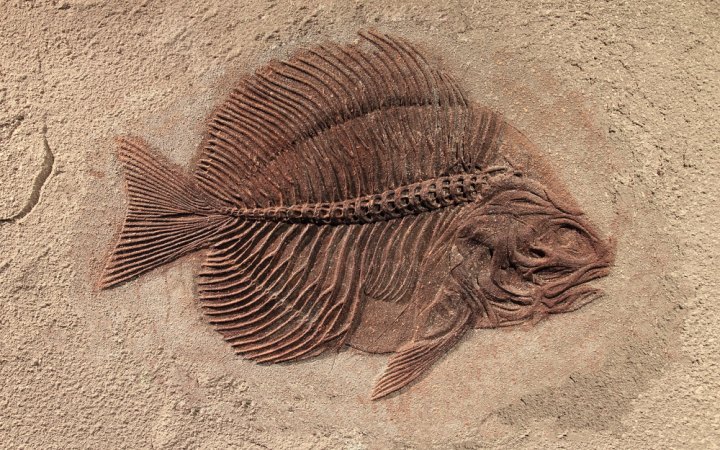第二十一章 生命在前進
It isn't easy to become a fossil. The fate of nearly all living organisms—over 99.9 percent of them—is to compost down to nothingness. When your spark is gone, every molecule you own will be nibbled off you or sluiced away to be put to use in some other system. That's just the way it is. Even if you make it into the small pool of organisms, the less than 0.1 percent, that don't get devoured, the chances of being fossilized are very small.
要變成化石可不容易。幾乎所有的生物——其中的99.9%以上——的命運是化為烏有。你的生命火花一旦熄滅,你曾擁有的每個分子都將被啃掉或被沖走,用來形成另一個體系。事情就是那樣。即使你把那個不足千分之一的部分變成一小攤微生物而沒有被吃掉的話,變成化石的可能性也很小。

In order to become a fossil, several things must happen. First, you must die in the right place. Only about 15 percent of rocks can preserve fossils, so it's no good keeling over on a future site of granite. In practical terms the deceased must become buried in sediment, where it can leave an impression, like a leaf in wet mud, or decompose without exposure to oxygen, permitting the molecules in its bones and hard parts (and very occasionally softer parts) to be replaced by dissolved minerals, creating a petrified copy of the original. Then as the sediments in which the fossil lies are carelessly pressed and folded and pushed about by Earth's processes, the fossil must somehow maintain an identifiable shape. Finally, but above all, after tens of millions or perhaps hundreds of millions of years hidden away, it must be found and recognized as something worth keeping.
若要變成化石,必須具備幾個條件。首先,你得死在恰當?shù)牡胤健V挥写蠹sl5%的巖石能夠保存化石,因此倒在一個未來的花崗巖所在地是沒有用處的。實際上,死者必須埋在沉積物里,在那里留下個印子,就像泥濘里的一片葉子那樣,或者在不接觸氧氣的情況下腐爛,讓骨頭和堅硬的部分(在極少數(shù)情況下還有較軟的部分)里的分子由溶解的礦物質(zhì)取而代之,按原件創(chuàng)造出一個石化的版本。接著,在化石所在的沉積物經(jīng)受地球運動的隨意擠壓、折疊和推動的過程中,化石必須設(shè)法保持一種可以識別的形狀。最后,尤其重要的是,在藏匿幾千萬或幾億年以后,還得有人發(fā)現(xiàn),認為這是值得收藏的東西。
來源:可可英語 http://www.ccdyzl.cn/Article/201809/565667.shtml











